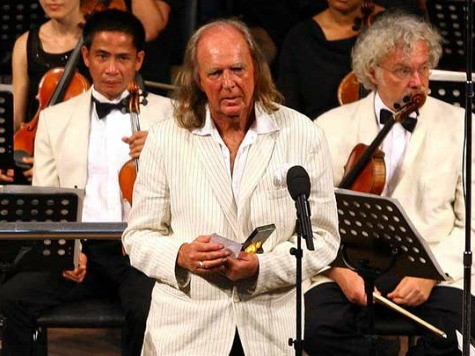By ROBERT BARR
Associated Press
LONDON
British composer John Tavener, whose career was boosted with the help of The Beatles and who often is remembered for the elegiac song performed as Princess Diana’s coffin was carried out of Westminster Abbey, died Tuesday. He was 69.
Tavener’s publisher, Chester Music, said he died at his home in Child Okeford, southern England.
Born and trained in London, Tavener composed the beautiful “Song for Athene”–reworked as “Songs of Angels”–that caught the public’s mood at Diana’s funeral.
His wistful, elegant setting of William Blake’s poem “The Lamb” (1982) became a staple of Christmas carol services.
“I think there are an awful lot of artists around who are very good at leading us into hell,” Tavener once said. “I would rather someone would show me the way to paradise.”
An imposing figure, Tavener was strikingly tall–6 feet 6 inches (198 centimeters)–thin, and wore his hair long.
James Rushton, managing director of Chester Music, called Tavener “one of the unique and most inspired voices in music of the last 50 years.”
“His large body of work–dramatic, immediate, haunting, remaining long in the memory of all who have heard it, and always identifiably his–is one of the most significant contributions to classical music in our times,” Rushton said.
Tavener’s music was distinguished by quiet passages which seemed to shimmer like dawn light, and by its other-worldly intensity and moments of ecstasy. He spoke of some compositions arriving instantaneously in his mind.
“If one is going to create this eternal, celestial music, one has got to listen, to be silent, to hear the angel of inspiration dictate,” he said in his 60th year.
Tavener was born on January 28, 1944, into a music-loving family in north London. At an early age he began to improvise and compose at the piano. As a teenage organist in a Presbyterian church, he conducted adventurous modern works including Michael Tippet’s “A Child of Our Time,” Benjamin Britten’s “A Ceremony of Carols” and Igor Stravinsky’s “Symphony of Psalms.”
Abandoning an ambition to be a concert pianist, Tavener studied composition at London’s Royal Academy of Music.
His 1968 cantata “The Whale” brought him fame with the help of The Beatles, who released it on their Apple records label.
Tavener said he caught the attention of John Lennon and Yoko Ono at a party by playing a tape of his opera, “Notre Dames des Fleurs,” inspired by Jean Genet’s novel about a prisoner’s sexual fantasies.
The opera–which was later lost–featured obscene lyrics, a choir and what Tavener called his “thunderous” performance on the organ.
Lennon offered a recording deal the next day, Tavener said, but it needed another Beatle to get “The Whale” to market.
“It took Ringo, who is a lot more pragmatic than John,” Tavener said in a BBC interview. “Ringo actually brought out `The Whale’ and `Celtic Requiem.'”
“The Whale,” he said, “was a piece written by an angry young man … because the world didn’t see the cosmos in metaphysical terms.”
Tavener’s later, better-known works flowed from his conversion to Orthodox Christianity and his collaboration with Mother Thekla, a Russian emigre and Orthodox nun to whom he turned for support after his mother died in 1985.
Thekla’s short “The Life of St. Mary of Egypt” inspired his 1992 opera, “Mary of Egypt,” and she provided many of the librettos for other works.
The fruits of their collaboration included “The Protecting Veil” in 1987, “Song for Athene” (1993), “The Apocalypse” (1993), “Fall and Resurrection” (1999), and “We Shall See Him as He Is” (1993).
Tavener dedicated his book “The Music Of Silence: A Composer’s Testament” (1999) to Mother Thekla. She “helped me put my music and my life together,” he said.
Their relationship was severed in the early years of the 21st century as Tavener’s interests spread beyond Orthodoxy to embrace the insights of other traditions. She died in 2011.
His marriage in 1974 to Victoria Maragopoulou, a dancer, effectively ended after eight months, though they formally divorced only a decade later on grounds of non-consummation–which Tavener later said was not true.
Tavener suffered many health problems.
He had the genetic disorder Marfan syndrome, suffered a stroke at 30, and in 1991 had difficult surgery for a leaking aortic valve.
He was supported in his recovery by Maryanna Schaefer, who jolted him out of his self-absorption and later in 1991 became his wife.
The couple had two daughters, Theodora and Sofia, and a son, Orlando, who survive him.
Tavener ranged widely in geography and spirituality in his pursuit of what he described as innocence.
Many of Tavener’s solo parts were written for the Indian-born soprano Patricia Rozario. He was drawn, he said, to “the ecstatic quality of her voice.”
He found something like that in the “savage, untamed quality” in the voice of Bjork, the Icelandic pop star for whom he wrote “Prayer of the Heart” (2004). She also introduced him to an Apache medicine man, an encounter which Tavener said provoked a vision that night that “all traditions lead to the center, which is God.”
Tavener, whose work was championed by Prince Charles, received a knighthood from Queen Elizabeth II in 2000 for services to music.
____
Associated Press writer Jill Lawless contributed to this report.

COMMENTS
Please let us know if you're having issues with commenting.